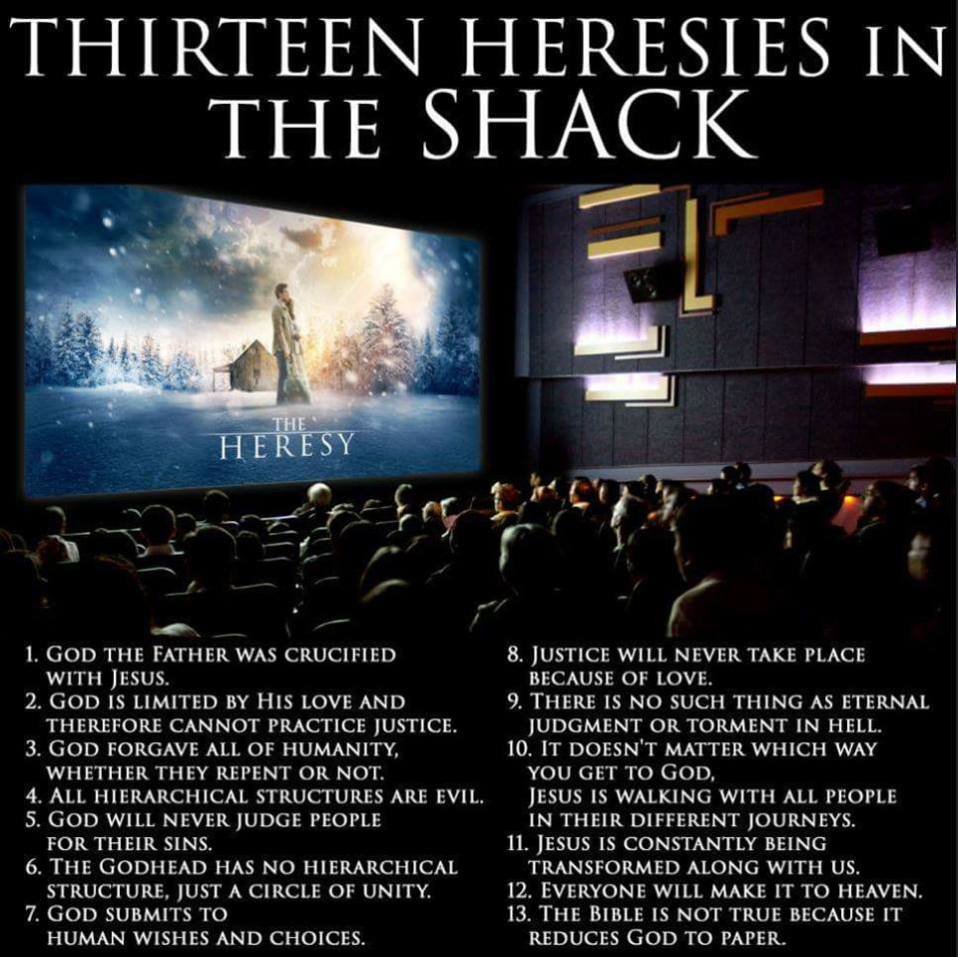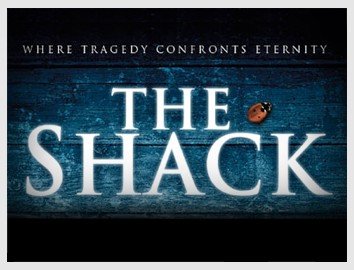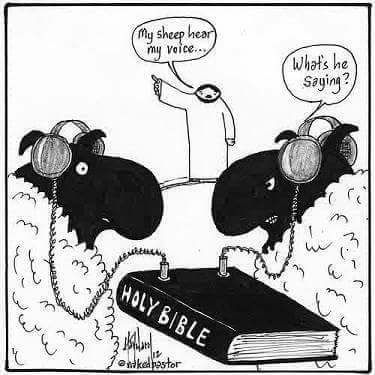Lately, I’ve been publishing quite a bit on ‘The Shack‘, by Wm. Paul Young, recently; personally I believe that it is one of the most profoundly influential books of our present age – in a good way. I believe that this book, and especially now it’s out as a movie, will bring more people into the knowledge of our good God than anything else in recent times. This book/movie emphasises the goodness of God rather than the anger that many Christians have majored on over the last couple of centuries. At last, God is publicly being portrayed as benevolent, understanding and loving rather than being armed with a thunderbolt rifle with sniper’s scope.
But of course it has its detractors. And they have – well, it’s almost a ‘mantra’ for Shack-haters – a meme giving thirteen ‘heresies’ that The Shack supposedly presents. I get the impression that, generally (as in the link I share at the end of my post here), most of these detractors have not read the book, but they go ahead and ‘warn’ people about how ‘bad’ the ‘heresies’ are that The Shack ‘spreads’. And it therefore seems to me that actually a lot of this has blown up on hearsay…but anyway the take-home message is that the detractors discourage believers from reading The Shack because it is ‘dangerous’. And this comes as no surprise, because the book actually depicts the path to freedom. If you read the book with an open mind and open heart, trusting God to protect you from all ‘dangerous heresies’, then you will come away from the book with an entirely new outlook on God, and a closer relationship with Him. The enemies of this work do not trust the Holy Spirit to ‘lead us into all truth’ (Jn 16:13), but instead these self-righteous people use the vile weapons of slander, misquoting, hearsay, Chinese whispers, twisting, context breaking, fabrication, and otherwise mauling the pure message of the book – which in my opinion was inspired by the Holy Spirit, and is certainly the genuine product of one man’s walk with God through some of the darkest times anyone can ever experience.
Paul Young has walked the walk; he’s earned the right to talk the talk!
So, here are the ‘Thirteen Heresies’. The reason I am showing them to you is a) to let you see how ludicrous they are and b) to prime you for a rebuttal article which really is excellent.

So, there we go. Actually, many of those points are not actually heresies at all, at least not demonstrably, and indeed many are a matter of opinion. For example, point 7 – ‘God submits to human wishes and choices’ – could that not be what we term ‘free will’? These people are assuming that because these points are under the big lettered title ‘THIRTEEN HERESIES’ that nobody will question the assertions – or even attempt to think for themselves. Well, maybe their intended audience think like that, but not this believer, matey! 😀 Over thirty years as a professional scientist have taught me to question everything (1Thess5:21), and God can cope with that, believe you me. But of course the people who write this stuff discourage questions, at least those with answers they can’t cope with. Remember that most Pharisees will label as ‘heresy’ something that in fact is just something they don’t agree with. Get god on your side, and that backs up your argument and proves your point. Lol. Remember, one man’s heresy is another man’s freedom.
Usually, those in the freedom are the happier people! 🙂
So, to bring this blog post back to the positive, to the upbuilding of the saints, here is a beautiful piece, by Joshua Greeson, which humorously – and yet definitively – answers these claims of ‘heresy’. And then some. Read. Ponder. Soak. Be blessed.
Over to Joshua. All links in his article will take you to other articles on his website:
13 Heresies that The Shack Destroys
Everyone’s talking about The Shack. Some hate it, some love it. Those are the two options it seems. I’ve read the book, listened to the audio book, and seen the movie. All Great! My personal favorite is the audio book (kudos to the voice actor!). Anyway, I’ve seen a sad little meme floating around in recent weeks that says, “13 Heresies in The Shack.” I investigated it and found a few problems. First, some of the things on the list are nowhere to be found in the runaway best seller book by William Paul Young. Second, other things on the list are not heresies. Third, there are brief notes to “support” the meme that quote crazy Scripture references that do not even come close to making the point they want them to. Last, I found the actual video of the preached message that inspired the meme. I’ll just say it was sad, sad, and more sad. In protest to all of this anti-Shackery, I decided to write this extra-long blog post that counters their list, and names their counter-points as heresies.
[Apology: I’m playing fast and loose with the word “heresy” here only to reflect the loosey-goosey use of it by these “Anti-Shack-ers,” as I’ll call them. If I was speaking accurately, I would say that some of these things are actual heresy, some others are bad interpretation, and others might just be differences of theological opinion among family members. That said, I see why these other folks like to throw the word around. Super fun!]
HERESY #1: God the Father abandoned Jesus on the cross.
Yes, I know, Jesus said, “My God, My God, why have You forsaken Me?” However, have you ever read the whole Psalm He was quoting? Was Jesus subverting the idea that God had forsaken Him by quoting Psalm 22, which after lamenting the experience of the human perception of God’s absence, rejoices in the truth: “For he has not despised or scorned the suffering of the afflicted one; he has not hidden his face from him but has listened to his cry for help.” Also, I have news for you, Jesus Himself said that God would NOT abandon Him:
“Indeed the hour is coming, yes, has now come, that you will be scattered, each to his own, and will leave Me alone. And yet I am not alone, because the Father is with Me.” (John 16:32)
Lastly, if God forsook Jesus, how did Jesus then “commend (His) spirit into (the Father’s) hands” as He breathed His last breath on the cross? He was able to trust God in that moment, because He knew that God would never abandon His only Son. No, the truth is that “GOD WAS IN CHRIST RECONCILING THE WORLD TO HIMSELF” (2 Cor. 5:19). When did that happen? Do the math. The Father, Son and Spirit are an inseparable Trinity, and God was in Christ on the cross. Jesus said, “I only do the things I see my Father doing,” and that it was the Father in Him doing His works. If Papa wasn’t getting nailed to the cross, then neither was Jesus. Holy Spirit was also there in the body of the God-Man Jesus as He hung on the cross. “For in Him [Jesus] dwells ALL the FULLNESS OF THE GODHEAD BODILY” (Colossians 2:9). All of the Three-in-One God suffered the pain of self-sacrificing Love for hurting humanity as Jesus poured out His passion to rescue us from our broken mindsets and self-destruction.
HERESY #2: God’s justice is separate from, equal to—and might be opposed to—His Love.
God’s justice is something God does, and like everything He does, it flows from Who He is. The Scriptures tell us that God IS Love (1 John 4:8, 16); but there is NOT ONE Scripture that tells us that God IS Justice. God does justice, yes; but He IS Love. God IS NOT Justice who does Love. God IS Love who does justice.
What is this Love, from which true Justice flows? Among other things, He is not easily offended; He suffers long and is kind; He is not easily provoked; He thinks no evil; He bears all things, believes all things, hopes all things and endures all things; He shows no partiality and doesn’t take sides; He weighs the heart and knows the things that have shaped us; His Love never runs out, and His mercy endures forever—there is NO expiration date on this Love and Mercy from which true Justice flows. This is the Love that God IS, and always will be. This Love is perfectly free to practice Justice, although this Justice that proceeds from Love might look differently than our sadly limited human perceptions of “justice.” We’ll see more on this in points #5 and #8.
HERESY #3: God’s forgiveness hinges on human action, and is obtained through a transaction.
This heresy says that whenever a person manages to muster up some repentance and faith, God will then subsequently respond to these individuals by forgiving them. This is false (Yes I know 1 John 1:9, Matthew 6:14-15, Mark 11:26 etc. but I’d have to expound on the Lamb slain before the foundation of the world; but alas, the space of a blog post is limited).
Jesus commands us to forgive others–irrespective of their response or lack thereof– 70 times 7 times. If you do the literal multiplication, that’s 490 times; but if you understand Jesus’ lingo, you know this means we are to forgive unlimited times, forever, regardless of whether or not the other person apologizes, cries a few sincere tears, proves they’ve changed by their long-term improved behavior, or in any other way “earns” or “deserves” it. If He expects us to freely offer forgiveness—even without the other party’s apology, or sorrow, or merit—while He Himself withholds forgiveness until someone jumps through some hoops and proves they’re worthy, then God is a hypocrite that says, “Do as I say, not as I do.” We’ll consider this again in point #7.
HERESY #4: God’s perfect will and design for humanity is for some men to rule over others.
If you can show me that in the Garden, without twisting the word “helper” into a subservient role (because, after all, this same Hebrew word is used throughout the Old Testament to describe God’s role in relation to humanity—so yeah, not a subservient underling), I’ll have a listen. People began to walk in a cursed way of self-will, and part of the result of that is that some began to “rule over” others (Gen.3:16). As you probably know—we are presently living in a time of broken human relationships that are out of the order of God’s design of others-focused, self-giving, self-sacrificial Love. Let he who would be great among you be your servant.
HERESY #5: God’s judgment on sin is unending punishment with no redemptive aim in sight.
No, in the Shack, God says, “Sin is its own punishment.” Romans 6:23 says that the payoff of sin is death. Those two statements say the same thing. Yes there will come a day of judgment. God’s “judgment” is His wisdom and decisions about how best to bring about “Justice”—again, how to set things right. His judgment is to bring about His perfect will for His creation. His judgment is His determination of how to bring a person to their predestined end—which is to be conformed to the image of Christ (Romans 8:29). He alone knows each heart (Acts 15:8; 1 John 3:20). He alone knows how to turn the heart of each person (Proverbs 21:1). God has a purpose in His judgments. He has the wisdom and the patience to pull it off in due time.
HERESY #6: The Godhead is a hierarchy composed of a Father in charge, a Son who obeys, and a Spirit who is subordinate to them both.
This is a false concept that divides the Trinity. This turns a Three-in-One God into three gods, with three wills, and turns Christians into polytheists. Yes, I know that Jesus during His earthly journey said, “the Father… is greater than I,” and yes, He also said, “Not my will, but your will be done.” However, this was during a time of His self-imposed limitations as a man in the flesh. He spoke from that place of humanity’s weakness, for that occasion. We must not take these statements and try to apply it to the essence of the Eternal Word. Yes, Jesus will one day hand the kingdom to the Father, but before that, the Father exalted Jesus and gave Him a name above every name. Yes, Holy Spirit glorifies Jesus; and yet Jesus credits the Holy Spirit for all of His miracles. The Trinity is and always has been a circle of self-giving, others-focused Love and mutual submission, service and honor. But a hierarchical Trinity is a house divided against itself that cannot stand. The Three are One—always have been, and always will be. The “how-to” part is the judgment of God.
HERESY #7: God is not open to input from people.
Let’s just say I find it amusing that on one hand the anti-Shack-ers call it heresy that “God submits to human wishes and choices,” while on the other hand insisting that God must forgive you if you repent, believe, choose Jesus, etc. Does the glaring contradiction here escape them? Also, if they really don’t think God is open to being influenced at all by humans, why do they continue to ask for things in prayer? We could use their own understanding of the stories of Moses, Abraham, Jonah/Nineveh, Hezekiah/Isaiah and more to further grind this heresy to dust; but I’ll just leave that one there.
HERESY #8: Justice is punishment; and punishment is justice.
To pick up where we left off in point #2 – What does Justice that proceeds from Love look like? Is it only punishment? Or is it discipline, training and correction that leads to the betterment of the offender (Clue: Hebrews 12)? Or is justice setting things right? Is Justice healing? Is Justice correcting, reforming and rehabilitating the one who sins? Or is it punishing them without end and without goal (and therefore without purpose)? Is justice allowing the rebellion in someone’s heart to continue endlessly, thus preserving evil? No, God’s Justice brings healing for both perpetrator and victim. God’s justice seeks the changed heart of the sinner (repentance), the freed heart of the victim (forgiveness), and restoration to every relationship.
Does the parent of a slain child feel that “justice” has been done when the murderer is placed in jail or given the death penalty? No! Justice would only be done by the parent receiving their child back from the dead, their heart being soothed and softened by the working of God’s Spirit, the offender being corrected, genuinely reformed and healed and repentant, and the victim willingly forgiving and restoring the offender to dignity as a fellow child of God.
I know this might seem idealistic and unrealistic (and maybe even impossible) when looking at it from our fallen world’s mindsets; but is this too hard a thing for God? Is His arm made short? Shall not the Judge of the earth do right?
HERESY #9: God created all people, even with the foreknowledge that some—maybe even most—will end up burning forever in eternal, conscious torment.
This view turns God into either a moral monster or a kind-hearted failure—take your pick. An everlasting hell created by a fore-knowing God is the ultimate challenge to God’s character and/or power. We might turn to a quote most often attributed to Epicurus: “Is God willing to prevent evil, but not able? Then He is not omnipotent. Is He able, but not willing? Then He is malevolent. Is He both able and willing? Why where does evil come from? Is He neither able nor willing? Then why call Him God?”
Would YOU have four children of your own, knowing in advance that three of them would burn forever in a pit of fiery torment that you created? Yes? [Note to self: discreetly unfriend this person on Facebook.] No? Do you then imagine yourself to be more merciful and loving than God? If your neighbor did this, would you commend Him for his “higher ways,” or would you decry his actions as child abuse? And yet you would deny your own conscience by determining if God does it, it is good—in spite of how evil it may be?
HERESY #10: Jesus only works within the confines of “Christianity.”
Jesus is “the Way, the Truth and the Life. No man comes to the Father, except by (Him).” This is a fact. To paraphrase what Paul Young said in The Shack, all roads don’t lead to God, but God will travel any road to find someone. Yes, Jesus is working in every life—regardless of their religion, their character, their response, or their lack of response. He will ALWAYS be working in every life, never leaving, never forsaking, drawing, wooing, and loving unconditionally. Jesus spent His whole ministry hanging around with “sinners” and watching the religious folks get mad about it. NEWS FLASH: Not one of Jesus’ beloved disciples, friends, or fans was a Christian. Not. Even. One.
[See THIS POST and THIS ONE TOO. ]
HERESY #11: Jesus changed God.
I know this one is unrelated to #11 on the meme I am countering here; but their #11 was so far out in left field and unrelated to anything actually in The Shack, I had to just make up a new one for my #11. God doesn’t change, and The Shack affirms this. Jesus is the only perfect image of the Father. Any image of God that doesn’t look like Jesus is like seeing “through a glass darkly” (1 Corinthians 13:12). It’s like trying to know God’s character by watching His shadow (Hebrews 10:1). It’s like trying to see the face of God through a veil (2 Corinthians 3:14-18a). Do we have pictures of God that make Him look different than what we see in Jesus? Yes. One “Christian” understanding of this is that God changed because His bloodlust was assuaged by the debt-paying sacrifice of His Son. I understand that this view (Penal Substitutionary Atonement) can be pieced together from Scripture if that’s what you’ve been preconditioned to find there (Thanks a lot, Anselm and Calvin). However, we can also find the view that God laid down His Own life in the flesh, to assuage the bloodlust of mankind, and to demonstrate that – even at our worst – He will not count our sins against us, but has chosen to forgive instead. The second picture is the one that is actually most compatible with the idea that God doesn’t change. Make of that what you will.
[See also THIS POST if you want more on this subject.]
HERESY #12: Heaven is a magical cube in the clouds, and only a small percentage of humanity will “go there.”
For now we’ll overlook the strange perceptions some Christians have of what heaven actually is. Whatever and wherever “heaven” may prove to be, the question here is who will “make it” there? Will Jesus lose some of the people He created? Or will everyone eventually experience the redemption He’s provided? If He wants us to pray for ALL MEN because HE WILLS AND DESIRES THAT EVERY PERSON WILL REPENT AND BE SAVED (1 Timothy 2:1-4, etc.), is He just sending us on a wild goose chase, praying pointlessly for a goal He has already determined can never be? Does He desire the salvation of all people, but is unable to pull it off?
What if this gospel really is GOOD NEWS of GREAT JOY to ALL MEN (not just the lucky few who win the cosmic lottery or make a good decision)! Some dare to believe that every knee will at some point willingly bow and declare Jesus to be Lord (Philippians 2:10-11), declaring that their righteousness is from the Lord. Some hope and pray that His Love will prove to be irresistible, even to the hardest of hearts. Some have the audacity believe that God just might be loving enough, wise enough, and patient enough to find a way to change every mind, and turn every heart toward Himself. Some believe that Christ will eventually sum all things up in Himself, and hand the whole enchilada over to the Father, and God will be all in all (1 Corinthians 15:22-28). This great hope prevailed for the first 5 centuries of the Church. Permit us this hope, as it is well within the bounds of the historic Christian faith.
[ For just a bit more on this, see THIS POST ]
HERESY #13: The Bible is all there is to know about God, and God doesn’t communicate anymore.
There are certain strains of Christianity that teach that God doesn’t speak or give revelation to His people anymore. They say that the revelation described by Bible is the end of God talking. And yet, they proclaim that they don’t have a religion, but a “relationship” with God through Jesus. What kind of “relationship” is it, exactly, in which one party does not communicate? No, even the Bible says:
Hebrews 1:1-2a
God, who at various times and in various ways spoke in time past to the fathers by the prophets, has in these last days spoken to us by His Son…
He has spoken to us by His Son, Jesus. We’ve had millennia of prophets and oral tradition and writings and codes and ritual, and now God offers us His clearest revelation: JESUS. Jesus said that all of Scripture was there to point us to HIM (John 5:9). Now if we’ve started a relationship with Him as we claim, let’s carry on in getting to know Him by His Spirit.
Do you believe that God has a “calling” for your life? By what means do you gain a revelation of said calling—the Bible? Does it say in there, “Bob Jenkins, I made you with a gift for the arts?” I must have missed that verse in my 40 years of reading the Bible. Has God ever shared a word with you through another person? If not, why do you listen to a preacher? Why do you listen to Christian music? Has God ever loved you through your spouse, or children, or parents, or anyone at all? If you think that He hasn’t, I’m afraid that says more about your awareness than it does about God’s communication skills. He is always speaking. He is always telling you in countless ways, on countless days, how He loves you. His sheep hear His voice, they don’t just read His book.
[ See THIS POST for more on that]
NOTE: If you actually want to study out the theology of The Shack and discover its orthodoxy, this book by PhD theologian, C. Baxter Kruger, is hands-down the best resource for you: CLICK HERE TO GET The Shack Revisited on Amazon.
I hope this post was interesting, or encouraging, or enlightening, or challenging, or at least mildly amusing. Let me know your thoughts!
Now, doesn’t that just lift your spirit? Click the image below to go to the original article.

As I promised/threatened above, here is a typical example – the website I mentioned above – of the sort of ill-informed drivel that ‘Shack-haters’ come out with. Take careful note of all the self-righteous, unctuous, judgemental, passive-aggressive, ‘concerned’ tones they have in their toadying ‘discussion’. This really does make me want to puke, and I apologise for including it, even for comparison’s sake. I’m not even going to honour the site with a picture link!
Here it is.
I am sorry for the negative feel of some of this post; it is indeed very, very difficult for someone like me, who has experienced (and continues to experience) the fulness of God’s Grace in reality, to look at such tosh as that website, and maintain a level and calm demeanour. I feel I need to expose these claims on these websites for the, yes, lies that they are. This is the kind of religion I escaped from a long time ago, and I never want to go back there. But the book ‘The Shack‘ is so full of life and revelation that it’s no wonder these people try to deny it to others. As usual, it’s all about control. They really are shutting the doors of heaven in men’s faces (Mt 23:13). Heaven’s gate-keepers, indeed! I tell you, the tax collectors and sinners are going into the Kingdom ahead of these people! 🙂 (Mt21:31) So, if you haven’t yet read The Shack, please can I encourage you to do so with an open mind. Go into it to read the story – which in itself is a great and moving story – and let God speak to you. To say the most often – used phrase in the Bible: ‘Don’t be afraid’. God will hold your hand and prevent your feet from stumbling (Ps 116:8).
In a rare change to my comments policy (in fact this is the first time!), I actually considered disabling comments for this post. This is because I do not want to attract comments from those who dislike The Shack. There are enough websites out there that try to defame this excellent book, without providing an arena for its detractors here as well. To me, The Shack is positive, and I want only positive things on this blog.
Therefore I will personally screen all comments for this post, and will simply disallow any comments which I consider to be negative.
Thanks folks 🙂

























